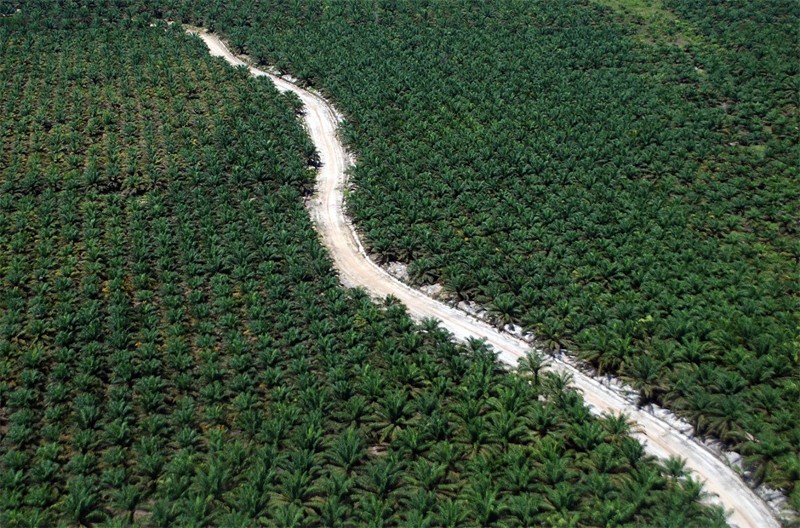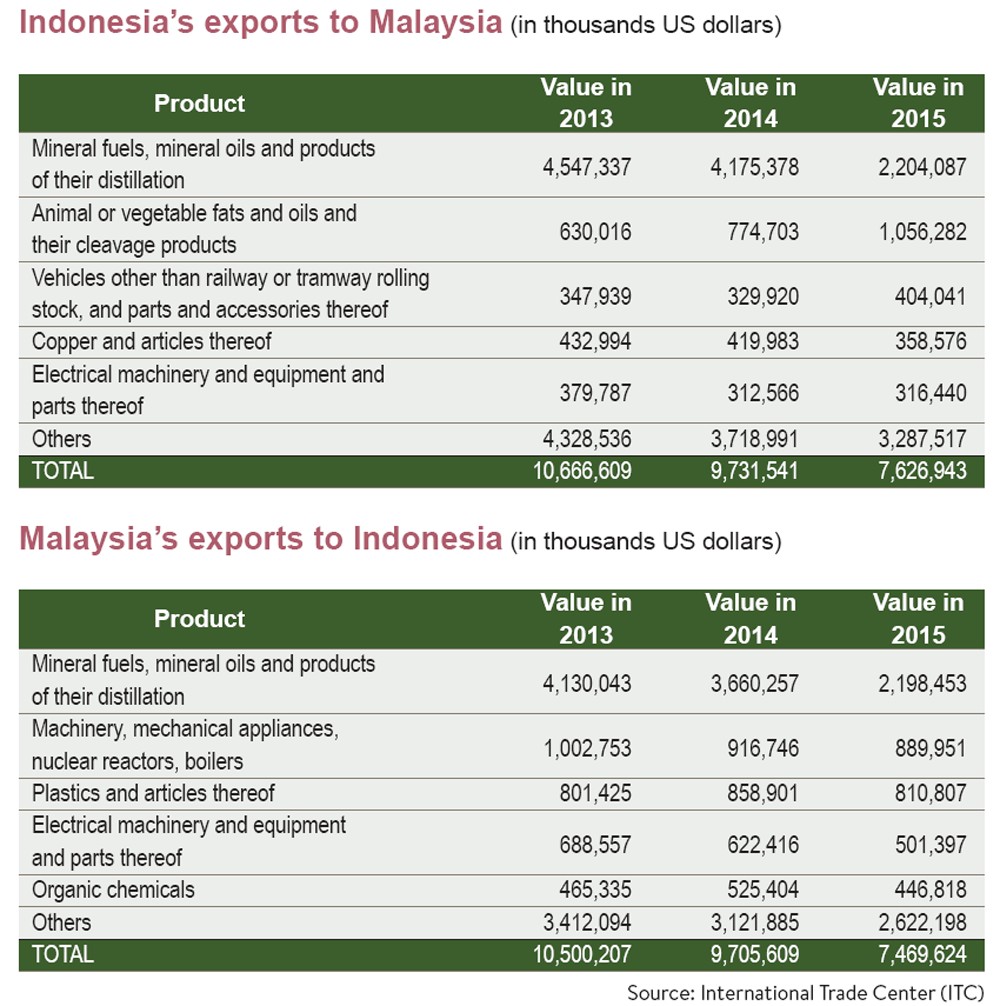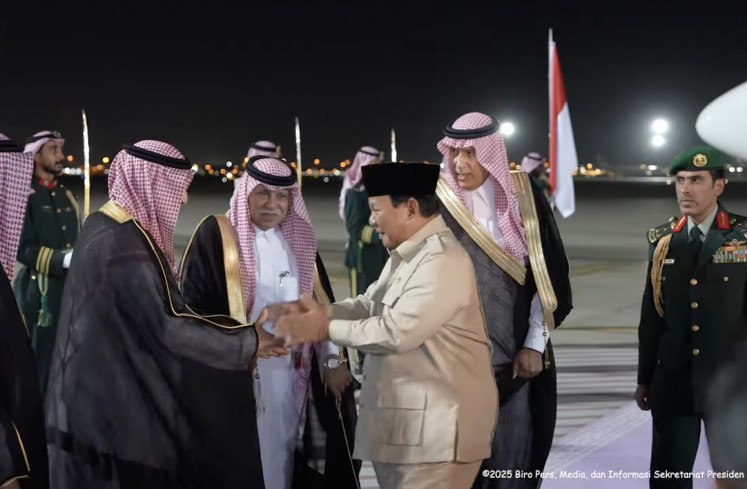Popular Reads
Top Results
Can't find what you're looking for?
View all search resultsPopular Reads
Top Results
Can't find what you're looking for?
View all search resultsIndonesia, Malaysia eye trade expansion beyond palm oil, petroleum
Change text size
Gift Premium Articles
to Anyone
 An aerial picture of a palm-oil plantation in Dumai, Riau, on Aug. 9. (Antara Photo/Rony Muharrman)
An aerial picture of a palm-oil plantation in Dumai, Riau, on Aug. 9. (Antara Photo/Rony Muharrman)
I
ndonesia and Malaysia expect to see an increasing volume of goods other than palm oil and petroleum products flowing between the two nations in an effort to reverse the declining trend in bilateral exports and imports.
Malaysia’s International Trade and Industry Minister Dato’ Sri Mustapa Mohamed said a lot more
could be done to boost trade between the two neighboring countries, despite the current global economic crisis.
“There hasn’t been much diversification in the pattern of trade between Malaysia and Indonesia. The volume of trade doesn’t reflect the true potentials of our economies,” he said during a business forum attended by businesspeople from both countries, held in Kuala Lumpur on Thursday.
Total exports and imports between the countries showed a declining trend in the past five years from US$17.8 billion in 2011 to $15.1 billion last year, with a surplus for Indonesia of $157.3 million, according to data from the Geneva-based International Trade Center (ITC).
Mustapa noted that Indonesia’s exports to Malaysia consisted mainly of palm oil and palm-based products and chemicals, while imports consisted largely of petroleum products, machinery, appliances and parts.
In his August visit to Indonesia, Malaysian Prime Minister Najib Abdul Razak said both countries could boost the annual value of their bilateral trade to $30 billion in the near future.
Mustapa said his side hoped to reach the figure by 2020 although he also acknowledged some considerable challenges.
“I know it’s unrealistic to achieve it by 2020 but we need to strive, the sooner the better,” he said.
During the forum, Indonesian businesspeople expressed their interest in exporting more value-added products to ASEAN countries. They, however, acknowledged that different standards for halal certification applied in every country, which remained one of the biggest challenges for such an expansion plan.
“The Malaysian market remains interesting for our [products] but the country’s halal [certification] standard makes it inefficient for us to export there,” said Juan Permata Adoe, Indonesian Chamber of Commerce and Industry (Kadin) deputy chairman for food processing, livestock and dairy products.
Indonesia and Malaysia, respectively, have the largest and second-largest Muslim populations in Southeast Asia.
Providing an example, Juan said a number of major dairy players, like PT Greenfields Indonesia, must apply twice for halal certification, in both Indonesia and Malaysia, before they were allowed to export their products to the neighboring country.
Indonesian Trade Minister Enggartiasto Lukita, meanwhile, said he planned to meet Muslim leaders from both countries to discuss the possibility of unifying halal certification.

During the forum, Minister Mustapa also shared his hopes of seeing a bigger contribution from small and medium enterprises (SMEs) in bilateral trade between Indonesia and Malaysia.
However, businesspeople said the homogeneity of SME products had made it difficult for small players to expand their markets.
“They [Malaysian SMEs] can actually produce what our SMEs make, like food, coffee, handicrafts and Muslim clothing,” said Kadin official Budiarto Linggowijono, who served as the business lobby group’s deputy chairman for SMEs for the 2010-2015 period.
“Today many foreign traders also visit Tanah Abang [textile market in Central Jakarta] to buy products from local producers. Looking at these opportunities, what our SMEs need is overseas business networks that help them make bigger sales.”
During their visit to Malaysia on Thursday, Kadin representatives signed a memorandum of understanding with the Malaysia External Trade Development Corporation (Matrade) to intensify communications and coordination to boost bilateral trade.
Earlier this month, Indonesia and Malaysia held a trade expo in Makassar, South Sulawesi, along with members of the Brunei Darussalam, Indonesia, Malaysia and Philippines East ASEAN Growth Area (BIMP-EAGA), to improve trade, investment and tourism in the ASEAN subregion.
_________________________
To receive comprehensive and earlier access to The Jakarta Post print edition, please subscribe to our epaper through iOS' iTunes, Android's Google Play, Blackberry World or Microsoft's Windows Store. Subscription includes free daily editions of The Nation, The Star Malaysia, the Philippine Daily Inquirer and Asia News.
For print subscription, please contact our call center at (+6221) 5360014 or subscription@thejakartapost.com









